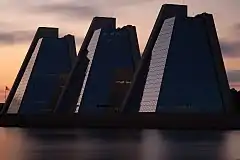The Pyramids (Indianapolis)
The Pyramids are three pyramid-shaped office buildings that are part of a 200-acre (810,000 m2) commercial development in College Park, Indianapolis, Indiana, USA. The structures occupy 45 acres (180,000 m2) of land situated next to a 25-acre (100,000 m2) lake.[1] They were constructed between 1967 and 1972 by the College Life Insurance Company (now part of Americo Life, Inc.) using a design by famed architect Kevin Roche.[2] They are noted for their abstract quality of the opacity of the concrete walls which face the nearby highway and the reflectivity of the glass curtain walls that face the landscaped grounds.[3]
| The Pyramids | |
|---|---|
 | |

| |
| General information | |
| Type | Offices |
| Location | 300 Depauw Boulevard Indianapolis, Indiana |
| Coordinates | 39.9201°N 86.2209°W |
| Completed | 1972 |
| Owner | CP Pyramids and Associates LP |
| Height | |
| Roof | 157 ft (48 m) |
| Technical details | |
| Floor count | 11 |
| Floor area | 350,000 square feet (33,000 m2) |
| Design and construction | |
| Architect | Roche-Dinkeloo and Associates LLC |
History
In the 1960s the College Life Insurance Company was rapidly expanding and sought to accommodate its growing staff while providing for anticipated expansion. It decided on a plan by Kevin Roche consisting of nine identical office towers each eleven stories tall and each containing 120,000 square feet (11,000 m2).[2] This would permit it to build towers as it needed additional office space without leaving buildings idle or underused. Only the initial three towers were constructed and take the form of pyramids.[4] In the late 1990s the site was re-landscaped and further construction of towers appears unlikely.[5]
Since they were originally constructed, the College Life Insurance Company has left the buildings and they are now owned by Cassidy Turley Commercial Realty Services, which rents space to various businesses in the Indianapolis area.[6] The Art Institute of Indianapolis is also located at the Pyramids. They are also noted as being among Roche's best works and contributed to his being awarded the Pritzker Prize.[7]
Structure
Each tower is made up of two walls of reinforced concrete from which project the unobstructed office floors.[2] Those concrete walls provide the support for the floors as well as serving as L-shaped service cores.[3] The other two walls are covered in blue exterior glass and each building is connected to the others via underground and above-ground passages.[5] Each pyramid has three cable passenger elevators. The buildings have been described as "abstract" and "sculptural" based on their use of opaque concrete walls facing the nearby highway and reflective blue glass facing the interior lake of the complex.[3]
References
- "A Landmark Design". Sling Shot Technologies, LTD. Retrieved 2008-10-09.
- Matthews, Kevin; Artifice, Inc. (2010). "College Life Insurance Co". GreatBuildings. Retrieved 2010-06-15.
- Scott, Murray (2009). Contemporary Curtain Wall Architect. Princeton Architectural Press. p. 50. ISBN 978-1-56898-797-2. Retrieved 2010-06-15.
- College Life Insurance Co. Administration Building at archINFORM. Retrieved 15 June 2010.
- Sullivan, Mary Ann (2003). "Pyramids at College Park". Bluffton University. Retrieved 2010-06-15.
- Cassidy/Turley. "The Pyramids". Retrieved 2010-06-15.
- Okula, Susan (1982-11-01). "Award-Winning Architect Links His Designs With Building Function". Kentucky New Era. Retrieved 2010-06-15.
External links
| Wikimedia Commons has media related to The Pyramids (Indianapolis). |